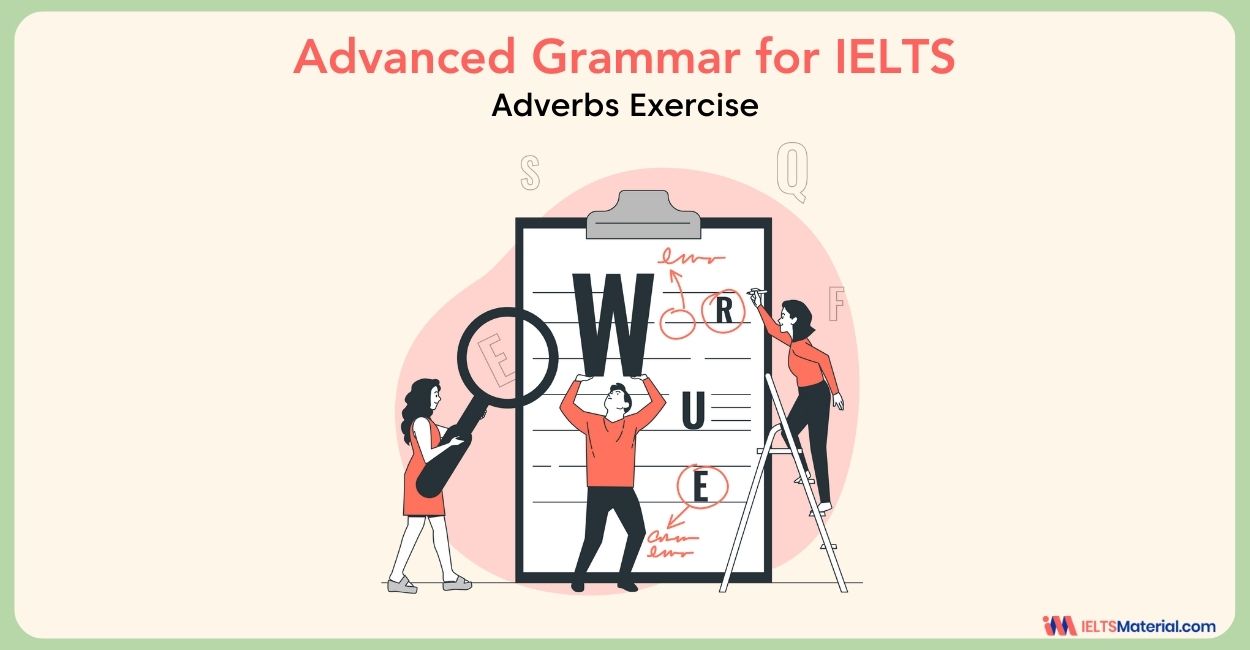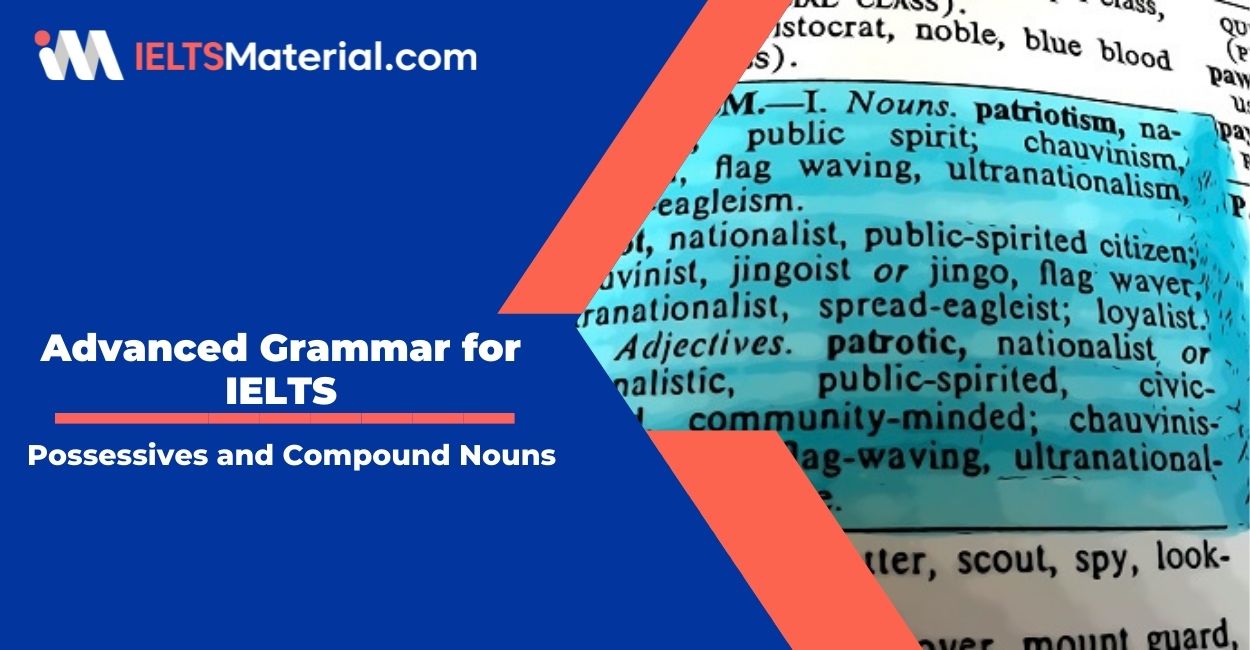Advanced Grammar for IELTS: Possessives and Compound Nouns
Table of Contents
Limited-Time Offer : Access a FREE 10-Day IELTS Study Plan!
IELTS Grammar is an essential part of every language, and IELTS assesses an individual on various aspects of their skills in the English language. One of the most mandatory skills that a candidate must demonstrate to obtain a higher IELTS band score is the use of advanced grammar such as Possessives and Compound Nouns for IELTS Writing and speaking tasks. Therefore, it is important to keep in mind that the application of useful grammar for IELTS writing and IELTS Speaking tasks can significantly improve your overall performance.
In this article, we have mentioned several examples of useful grammar structures for IELTS exam to help you enhance the quality of your answers.
Definition
Possessive Nouns: Possessive nouns are generally used to refer to ownership or possession, personal or professional relationships, persons or animals, and so on.
Compound Nouns: Whereas the compound noun describes the nature of the second noun, the first noun will have the same function as the classifying adjective like paintings, Sunday times earthquakes, and so on.
Diagnostic Test: Possessives and Compound Nouns
Eighteen of these sentences contain mistakes. Tick (✓) the correct sentences, then find the mistakes and correct them.
Example:
- Have you met my stepson’s new girlfriend yet?
- Have you met my stepson’s new girlfriend yet?
- Did you notice that greasy stain on the side of our sofa?
- Dave’s company has been awarded a contract to repair all the buses’ engines.
- People in this street are very proud of theirs manicured front lawns.
- Isn’t she your secretary’s brother’s boss?
- These gloves look familiar; I think they’re Joe’s.
- The villa we’re borrowing belongs to my sisters-in-law’s parents.
- I adore Lennon’s and McCartney’s music, especially the early stuff.
- This is Mario, he’s a colleague of Professor Grigson.
- I might be able to get you an interview; the owner’s a friend of me.
- Is that the new car for Hilary?
- Elizabeth’s the youngest daughter of Mr. Granger.
- Jem saw a fantastic article in the local paper of today.
- Galileo was NASA’s biggest project.
- It’s in a great location, only five minutes’ walk from the supermarket.
- Could you give me a dollar’s worth of those bananas, please?
- How about all of us going back to the house of my brother for some coffee?
- Did you manage to get an appointment at the doctor?
- Oh, for the sake of heaven, can’t you get a move on?
- He’s doing some research for his dissertation on anthropology’s history.
- The celebrities acknowledged the crowd’s cheers who lined the street.
- Astronomers predict an eclipse of the sun on April the thirteenth morning.
- Inspector Walters achieved fame with the famous serial killer’s arrest.
- Commentators have been stunned by the scale of the scandal.
- The processor is the computer’s main component, wouldn’t you agree?
- This term the class will be reading the short stories’ collection of Graham Greene.
- Everyone’s been admiring my expensive wife’s car.
- If there’s one thing I can’t stand it’s fussy children’s clothes.
- There’s a beautiful old house for sale at the local estate agent’s.
- If you want a really unique wedding dress, you need to find a good maker of dresses.
- Great news – the college is going to give me a one-year sabbatical.
[do_widget id=custom_html-47]
To help you out with this, we have brought best IELTS online classes, meant to clear your doubts regarding ‘Possessives and Compound Nouns.’
Grammar Explanation: Possessives and Compound Nouns
We can show the relationship between two nouns by using possessive forms or compound nouns. There are two basic possessive forms: the genitive (’s – eg. the company’s shareholders) and the structure (e.g. the shareholders of the company). This unit describes the forms and uses of the genitive and explains how we choose between this and of phrases. It also contrasts the use of possessives and compound nouns.
Form and Meaning
Possessive Forms
We can indicate the possessive form of a noun by adding ‘s or we can use the structure (noun + of + noun):
- There was a scratch on my car’s paintwork.
- There was a scratch on the paintwork of my car.
Note: We usually use the definite article before an of structure (except with the ‘double possessive’):
X on a paintwork of my car.
X on paintwork of my car.
✓ on the paintwork of my car.
There are possessive forms of pronouns and also possessive adjectives:
- You can’t use that card, it’s mine
- Oh sorry. I didn’t realize it was your personal photocopy card.
‘s – Basic Rules
These are the key rules about which form of the genitive ( ‘s/ s / ‘ ) to use:
| singular noun: add ‘s | house => house’s bus => bus’s |
| Singular proper noun ending in -s:
add ’s or an apostrophe (’) only |
Mr. James => Mr. James’s house/Mr. James’ house |
| Regular plural noun: add an apostrophe only | boys => boys’ buses => buses’ |
| Irregular plural noun (not ending in -s): add ‘s | men => men’s children => children’s |
| One. Somebody, Everyone, Each
other, etc.: add ‘s |
one’s house
somebody’s house nobody’s house everyone’s rights each other’s houses |
‘s – Special Rules
We can have two genitives together:
- We were beginning to get fed up with our neighbor’s tenant’s loud music.
If the meaning is clear from the context, we can use the genitive without a following noun:
- That isn’t my handwriting. It’s Selina’s. (= Selina’s handwriting)
If the possessive form consists of a compound noun or two or more nouns which form a single team or group we put the ’s on the last noun only:
- Are you coming to my brother-in-law’s party? (compound noun)
- I’m a great fan of Lerner and Lowe’s musicals. (They wrote as a single team.)
Note: When the nouns do not form a single group we must use ‘s with both nouns:
- Schrodinger’s and Heisenberg’s versions of quantum mechanics had seemed different. (two versions of the theory)
If the possessive noun is part of a short phrase (without a verb in it), we usually put the ‘s at the end of the phrase:
X The man’s in the corner dog began to bark.
✓ The man in the corner’s dog began to bark. (= The dog belonging to the man in the corner …)
The Double Possessive ( of structure + genitive)
We can use the genitive form and the structure in the same phrase (the double possessive) when we want to make the first noun specific, but at the same time shows that it is one of several. We usually use the indefinite article with this pattern:
- I heard the story from a friend of my brother’s. (= from one of my brother’s friends)
We do not always include the genitive ‘s on the second noun:
- They got a tip-off from a friend of the owner.
Note: The double possessive is common with pronouns. We always use the possessive pronoun:
XShe’s a friend of us.
X She’s a friend of our.
✓ She’s a friend of ours. (= We have several friends. She is one of them.)
The Genitive (‘s) or of Structure
The Genitive
We usually use the genitive ‘s (and not the of structure) to express the following ideas:
| Use | Example |
| Referring to general ownership, or possession of somebody’s home |
|
| Referring to people and animals (especially with proper nouns) and personal/ professional relationships and human qualities |
|
| Referring to a location in time (but not with dates) |
X It was in 19th December’s paper. |
| Referring to the origin of something, for example where It comes from or who made it. |
|
| Referring to a quantity or measure, for example of duration, distance or value
In expressions for value/quantity with worth With the names of shops, companies and people/places that provide a service In certain fixed expressions |
|
The of Structure (noun + of + noun)
We usually use the structure (and not the genitive ‘s) in the following situations:
| Use | Example |
| With abstract nouns (e.g. science) and when we are referring to inanimate things |
|
| When the noun is followed by a verb phrase or clause which defines it |
|
| When we refer to a specific date with long or complex phrases, even when we are referring to people certain fixed expressions and titles |
|
Either Pattern
We can usually use the genitive ’s or the structure to express the following ideas:
| Use | Example |
| Referring to a quality that something possesses or displays (but we prefer to use the genitive with human qualities) |
|
| Referring to the subject of something, it’s topic or theme with human creations such as countries, organisations, cities, institutions, machines, vehicles, buildings, etc. (The genitive is more common) |
|
| Expressing a reason or purpose with sake |
|
Genitive + of structure
The genitive and the structure can describe different types of relationships such as ownership, origin, and subject. To avoid confusion when we are describing more than one relationship between nouns in a phrase, we prefer to use the ’s genitive for the origin, owner or creator, and the of structure for the subject or topic:
X I wasn’t convinced by the quarrel’s description of the witness
✓ I wasn’t convinced by the witness’s description of the quarrel.
(the witness = the person who made the description; the quarrel = the topic of the description)
- One of our most popular exhibits is Van Dyck’s portrait of King Charles
(Van Dyck = the creator of the portrait; King Charles = the subject of the portrait)
We can also combine possessive forms with prepositions to describe a number of different relationships:
- Have you seen the National Gallery’s (ownership'(s)) portrait of King Charles (Subject (of structure)) by Van Dyck (creator (preposition))?
New Information With the of Structure
We can use the structure to put new information at the end of a sentence. Compare:
- American presidential candidate Robert Kennedy was assassinated in 1968.
X He was former president John F Kennedy’s younger brother.
✓He was the younger brother of former president John F Kennedy. (The new information is the reference to John F Kennedy.)
See also:
Specifying or Classifying Possessives and Compound Nouns
Specifying or Classifying Possessives
Possessive forms of nouns can describe two types of relationships. In most cases we use possessive nouns as ‘specifying’ words, showing a relationship with something specific, such as a person or place (underlining = stressed word):
- Marion washed the children’s clothes every Thursday. (= the clothes belonging to Marion’s children)
In other cases, possessive nouns can describe a ‘classifying’ relationship, describing the type of thing something is (underlining = stressed word):
- Janice decided to open a shop specializing in children’s clothes (= clothes designed for any children to wear)
We use adjectives in a different way depending on which type of relationship the possessive form is describing. With specifying possessives the adjective only describes the noun following it:
- She was suspicious of her wealthy brother’s girlfriend (= Her brother is wealthy.)
- She didn’t like her brother’s wealthy girlfriend (= His girlfriend is wealthy.)
But when we use adjectives in front of a possessive noun with a ‘classifying’ meaning, the adjective describes the whole phrase, not just the possessive noun which follows it:
- Janice’s shop had a large selection of hand-made children’s clothes (= The children’s clothes are hand-made, not the children.)
Other Classifying Relationships
We use and other prepositions to describe classifying relationships such as type of content, subject, source, and purpose:
- I’ve got a marvelous book of short stories by Somerset Maugham. (content)
- The kids have been watching a film about rollerblading (subject)
- I’m hoping to buy a sofa from that Swedish store (source)
- Our uncle’s company manufactures lubricants for ball-bearings (use/purpose)
Note: We do not use a possessive if there is a compound noun with the same meaning:
X I bought a new racquet at the sport s shop
✓ I bought a new racquet at the sports shop (sports shop is a compound noun)
Compound Nouns
Compound nouns are words that have been created by combining two nouns that are related to each other. They are similar to classifying possessives because the first noun ‘classifies’ the second noun, it describes it or tells us its purpose:
- dressmaker (= maker of dresses)
- fashion magazine (= magazine about fashion)
Compound nouns can be written as a single word (dressmaker), two separate words (fashion magazine) or two words joined by a hyphen (waste-bin). There are no rules for this and it is best to check in an up-to-date dictionary.
Compound nouns can also be formed by combining nouns with verbs or adjectives:
| noun + verb: | windsurfing | fire-eater | Thanksgiving | screwdriver |
| verb + noun: | cookbook | rocking chair | filing cabinet | swimsuit |
| adjective + noun: | highway | blackbird | real estate | easy chair |
Note: Some compound nouns are formed from multi-word verbs. They usually follow the same order as the verb, but there are a few exceptions:
- turn out => turnout
- spill over => overspill
- turn down => downturn
We can also make compound nouns from time expressions:
- a three-week holiday
- a four-hour delay
- a ten-minute drive
Note: Be careful with compound nouns describing containers. The compound form only describes the container itself, not its contents. Compare these examples:
| In a shop: |
|
| In a café: | X I’d like a teacup and a Mars bar, please.
✓ I’d like a cup of tea and a Mars bar, please. (= tea in a cup) |
Practice Exercise
Q 1.
Rewrite the sentences using genitive forms. The exercise begins with an example (0).
- The stories Steve told and the stories Jane told were completely different.
- Steve’s and Jane’s stories were completely different……
- I’m sure this bag belongs to somebody.
- Let’s go to the shop the girls own.
- That is the hotel belonging to Mr. Hollis.
- I love the operettas of Gilbert and Sullivan.
- It’s the fault of nobody.
- They had respect for the opinions of each other.
- The dog belonging to my next-door neighbour never stops barking.
- I’m fed up with the hopeless inefficiency of the secretary of my boss.
- The personality of my mother and the personality of my father are very alike.
- These aren’t my keys, they are the keys belonging to my flatmate.
- The new Act of Parliament will protect the right of everyone to privacy.
- The toilet for men is over there on the right.
- I’ve just inherited the house belonging to the brother of my grandmother.
- The opinions of residents of sink estates are rarely taken into consideration.
- The dance routines of Fred Astaire and Ginger Rogers are legendary.
Q 2.
Eight of these sentences contain mistakes. Tick (✓) the correct sentences, then find and correct the mistakes.
- Elizabeth is a good friend of him.
- I’m really fed up with my landlord’s wive’s endless complaints about noise.
- As the English say, ones’ home is ones’ castle.
- You should pay attention to what he says; he’s a close associate of the managing director.
- Don’t blame him; it was my own fault.
- She’s been put in charge of children’s’ activities at the summer camp in Maine.
- Since they got married they’ve only been interested in each other.
- My brother-in-law’s parents have decided to emigrate.
- We don’t know him very well; he’s just an acquaintance of us from our university days.
- There’s something wrong with that buses’ brake lights.
Q 3.
Choose the correct alternative, A or B. In some cases both options are correct.
1. What did you do …
- at the course’s end?
- at the end of the course?
2. Have you met …
- Sam’s new girlfriend?
- the new girlfriend of Sam?
3. … is a constant source of inspiration.
- Barcelona’s architecture
- The architecture of Barcelona
4. I need to visit …
- the doctor’s surgery.
- the surgery of the doctor.
5. Some debris got caught under …
- the conveyor belt’s wheels.
- the wheels of the conveyor belt.
6. Our organization strives towards …
- poverty’s elimination.
- the elimination of poverty.
7. The Ninth Symphony is arguably …
- Beethoven’s greatest work.
- the greatest work of Beethoven.
8. ….. is the search for personal fulfilment in a hostile world.
- The novel’s theme
- The theme of the novel
9. He’s taking … from his job at the university.
- a year’s sabbatical
- a sabbatical of a year
10. … sometimes drives me up the wall.
- My husband’s impatience
- The impatience of my husband
11. Throughout the flight, we had to put up with …
- the children sitting in the back row’s antics
- the antics of the children sitting in the back row.
12. The most senior clergyman in the Church of England is …
- Canterbury’s Archbishop.
- the Archbishop of Canterbury.
13. We’re going to hold the party at …
- Michael’s place.
- the place of Michael.
14. … was an important turning point in French history.
- 1789’s revolution
- The revolution of 1789
15. Researchers have been amazed by the … to mutate when attacked.
- virus’s ability
- ability of the virus
16. The vet wasn’t very pleased with …
- Fido’s progress.
- the progress of Fido.
17. Her doctoral thesis investigates … in medieval China.
- Confucianism’s spread
- the spread of Confucianism
18. The blessing will take place at …
- the Twelve Apostle’s church.
- the church of the Twelve Apostles.
19. Why can’t you just hand in your notice, …
- for heaven’s sake!
- for the sake of heaven!
20. … are generating a lot of excitement at the Paris fashion shows.
- Galliano’s latest designs
- The latest designs of Galliano
Q 4.
Use the words (1-15) in the box to form compound nouns that fit in the same numbered gaps in the text. You will need to add the second part of the compound yourself. The exercise begins with two examples (0) and (00).
- (o) lap
- (oo) buyer’s
| 1. brand | 8. hard |
| 2. mail | 9. word |
| 3. credit | 10. key |
| 4. high | 11. world |
| 5. shop | 12. out |
| 6. check | 13. short |
| 7. soft | 14. after |
| 15. after |
Today’s consumer guide looks at (0)_laptop_computers. The range of these portable computers on the market can be daunting, but a good place to start is computer magazines. These often contain useful (00)___buyer’s guides__and reviews of models currently on the market. Suppliers of the leading (1) ____often sell their products at cut prices through these magazines. If you decide to buy by (2)___you will find the advertisements a good source of bargains. And if you pay by (3)____you will automatically be insured. But if you need help in choosing a model, it might be better to shop in the (4)____where you can ask (5)_____for impartial guidance and advice.
You should make a (6)_____of the features and facilities you require and these will depend to a large extent on the way you plan to use your machine. If you use a lot of graphics (7)______you’ll need a fast processor, a large (8)_____and a high-definition screen. If you are only going to be using the machine for (9)_____processor speed will not be so important, but you will want a comfortable and sturdy (10) ______
Almost everyone these days needs to access the Internet in order to use e-mail and cruise the (11)______so look for a high-speed modem. Be aware of the input and (12)_____devices you want; CD and floppy disk drives usually come as standard, but you may want a DVD drive or a PC-card slot.
Once you have checked all these features you can compile a (13)_____of models you are interested in. Check that your chosen models include comprehensive (14)_______and ask your supplier about warranties and (15)______service.
Q 5.
Which explanation is correct, A or B?
1. Stephanie loved her beautiful daughter’s sports car.
- Stephanie’s daughter was beautiful.
- The car belonging to Stephanie’s daughter was beautiful.
2. There’s a new doctor’s surgery on the corner of Greenford Street.
- The doctor has recently qualified.
- The surgery has recently opened.
3. She inherited a wonderful wooden doll’s house.
- The doll is made of wood.
- The house is made of wood.
4. The company manufactures low-cost nurses’ uniforms.
- The nurses earn low wages.
- The uniforms aren’t expensive.
5. Gary didn’t think much of his new boss’s management techniques.
- Gary has a new boss.
- Gary’s boss has some new management techniques.
6. Bill and Suzy found hiring a well-educated children’s nanny was worth every penny.
- Their nanny was well-educated.
- Their children were well-educated.
7. I managed to find a place in the 24-hour supermarket’s parking lot.
- The supermarket is open 24 hours.
- The parking lot is open 24 hours.
8. Dave was often embarrassed by his aggressive flatmate’s comments.
- Dave’s flatmate was aggressive.
- His flatmate’s comments were aggressive.
9. My uncle is restoring a redundant tax inspector’s office in Newcastle.
- Some tax inspectors have been made redundant in Newcastle.
- The office in Newcastle is no longer required by the tax inspectors.
10. Who’s going to look after our sick neighbour’s puppy?
- Our neighbour is sick.
- Our neighbour’s puppy is sick.
Q 6.
Use compound nouns to complete the sentences. The compound nouns you need can be formed by combining words from each of the boxes below. Then rewrite these sentences using appropriate possessive forms to replace the phrases in brackets. In two sentences the phrase in brackets does not need to be changed.
| Land | jam |
| down | fit |
| horse | cabinet |
| news | robber |
| bank | stick |
| traffic | turn |
| data | agent |
| out | surfer |
| rail | racing |
| filing | walk |
| wind | lord |
| five-minute | ways |
| walking | bases |
- The only thing missing from (the office belonging to my boss) is a______
- The only thing missing from my boss’s office is a filing cabinet.
- Could you pop down to the___and pick up (the evening paper that Charles orders).
- That silver-topped_____belongs to (one of the friends that I have).
- The (private beach of the hotel) is only a_____from here.
- The (privatization organized by the government) of the_____is going ahead next year.
- The_____wouldn’t allow (the girlfriend of his tenant) to move in.
- (The pension fund of my father) has been badly affected by the_____in the value of blue-chip stocks.
- Clare bought a beautiful new_____for (the wedding of the sister of her brother-in-law).
- The_____managed to ignore (the screams of the crowd) lining the beach.
- Whenever we are over at (the house belonging to Dad) we seem to spend the entire time watching _____on the television
- The______refused to accept (the jurisdiction of the legal system) over him.
- (The firm my wife works for) specializes in setting up_____for insurance companies.
- The_____was caused by the volume of cars setting out for the south coast at (the start of the bank holiday)
Answer Key for Diagnostic Test
- on a-side => on the side
- ✓
- their’s -» their
- ✓
- ✓
- sister’s -in-law’s => sister-in-law’s
- Lemon’s-and => Lennon and
- ✓ (but also of Professor Grigson’s)
- a friend of me => a friend of mine
- the new car of Hilary => Hilary’s new car
- the youngest daughter of Mr Granger => Mr Granger’s youngest daughter
- the local paper of today => today’s local paper
- ✓
- ✓
- ✓
- the house of- my brother => my brother’s (house)
- ✓
- for the sake of heaven => for heaven’s sake
- anthropology’s history => the history of anthropology
- crowd’s cheers ==> cheers of the crowd
- April-the-thirteennth’s morning => the morning of April the thirteenth
- the famous serial killer’s arrest => the arrest of the famous serial killer
- ✓
- ✓
- the short stories’ collection of Graham-Greene => the/a collection of short stories by Graham Greene/ Graham Greene’s collection of short stories
- my expensive wife’s car => my wife’s expensive car
- ✓
- estate’s agent’s => estate agent’s
- maker of dresses => dressmaker
- ✓ (but also one year’s sabbatical)
Answer Key for Practice Exercise
Q 1.
- I’m sure this is somebody’s bag.
- Let’s go to the girls’ shop.
- That is Mr. Hollis’s/Mr. Hollis’ hotel.
- I love Gilbert and Sullivan’s operettas.
- It’s nobody’s fault.
- They had respect for each other’s opinions.
- My next-door neighbour’s dog never stops barking.
- I’m fed up with the hopeless inefficiency of my boss’s secretary/my boss’s secretary’s hopeless inefficiency.
- My mother’s and (my) father’s personalities are very alike.
- These aren’t my keys, they are my flatmates (keys).
- The new Act of Parliament will protect everyone’s right to privacy.
- The men’s toilet is over there on the right.
- I’ve just inherited my grandmother’s brother’s house/the house belonging to my grandmother’s brother.
- Residents of sink estates’ opinions/Sink estates’ residents’ opinions are rarely taken into consideration.
- Fred Astaire and Ginger Rogers’ dance routines are legendary.
Q 2.
- him => his
- wive’s => wife’s
- ones’ home is ones’ castle => one’s home is one’s castle
- ✓/managing director’s
- mine => my
- childrens => children’s
- ✓
- brother’s in- law’s => brother-in-law’s
- us => ours
- buses’ => bus’s
Q 3.
- B
- A
- A, B
- A
- A, B
- B
- A
- A, B
- A
- A
- B
- B
- B
- A, B
- A
- B
- B
- A
- A
Q 4.
- brand names
- mail-order
- credit card
- high street
- shop assistant
- checklist
- software
- hard disk
- word processing
- keyboard
- world-wide-web
- output
- shortlist
- instruction manuals
- after-sales
Q 5.
- A
- B
- B
- B
- A
- A
- A
- A
- B
- A
Q 6.
- Could you pop down to the newsagent and pick up Charles’/Charles’s evening paper.
- That silver-topped walking stick belongs to a friend of mine.
- The hotel’s private beach is only a five- minute walk from here.
- The government’s privatization of the railways is going ahead next year.
- The landlord wouldn’t allow his tenant’s girlfriend to move in.
- My father’s pension fund has been badly affected by the downturn in the value of blue-chip stocks.
- Clare bought a beautiful new outfit for her brother-in-law’s sister’s wedding/the wedding of her brother-in-law’s sister.
- The windsurfer managed to ignore the screams of the crowd lining the beach.
- Whenever we are over at Dad’s (house) we seem to spend the entire time watching horse racing on the television.
- The bank robber refused to accept the legal system’s jurisdiction/ the jurisdiction of the legal system over him.
- My wife’s firm specializes in setting up databases for insurance companies.
- The traffic jam was caused by the volume of cars setting out for the south coast at the start of the bank holiday.
Start Preparing for IELTS: Get Your 10-Day Study Plan Today!
Develop your Grammar from our Grammar Topics

Janice Thompson

Zuhana

Courtney Miller
Janice Thompson
Recent Articles

Courtney Miller

Zuhana
Janice Thompson




Post your Comments